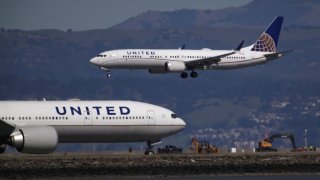
A United Airlines Boeing 737 Max 9 aircraft lands at San Francisco International Airport.
- The airline slashed its expected aircraft deliveries for this year amid Boeing's quality crisis and said it will add leased Airbus A321neo jets in the next few years.
- United expects to receive just 61 new narrow-body planes this year, down from 101 it said it had expected at the beginning of the year and contracts for as many as 183 planes in 2024.
- The U.S. carrier forecasts earnings of between $3.75 to $4.25 a share in the second quarter, ahead of estimates.
United Airlines shares surged more than 17% Wednesday to a seven-month high after the carrier forecast second-quarter earnings well ahead of Wall Street estimates despite ongoing delivery delays from Boeing.
The airline expects to post earnings of between $3.75 and $4.25 in the second quarter, ahead of analysts' estimates of about $3.76 a share. Airlines make the bulk of their profits in the second and third quarters, during peak travel season.
The carrier also reiterated its full-year earnings forecast of between $9 and $11 a share.
United cut its aircraft-delivery expectations for the year. It expects it will receive just 61 new narrow-body planes this year, down from 101 it said it had anticipated at the beginning of the year and contracts for as many as 183 planes in 2024.
"We've adjusted our fleet plan to better reflect the reality of what the manufacturers are able to deliver," CEO Scott Kirby said in an earnings release. "And, we'll use those planes to capitalize on an opportunity that only United has: profitably grow our mid-continent hubs and expand our highly profitable international network from our best in the industry coastal hubs."
United said it plans to lease 35 Airbus A321neos in 2026 and 2027, turning to Boeing's rival for new planes as the U.S. manufacturer faces caps on its production and increased federal scrutiny. In January, United said it was taking Boeing's not-yet-certified Max 10 out of its fleet plan. The airline said it has converted some Max 10 planes for Max 9s.
Money Report
It lowered its annual capital expenditure estimate to $6.5 billion from about $9 billion.
United is also facing a Federal Aviation Administration safety review, which has prevented some of its planned growth. A spokeswoman told CNBC earlier this month that the carrier will have to postpone its planned service from Newark, New Jersey, to Faro, Portugal, and service between Tokyo and Cebu, Philippines.
Get a weekly recap of the latest San Francisco Bay Area housing news. >Sign up for NBC Bay Area’s Housing Deconstructed newsletter.
Because of that review there are a "small number of aircraft" that won't be certified to enter service but it won't have an impact on the airline's overall capacity plans for the year, Kirby said.
United earlier this month postponed its investor day, which was scheduled for May, "because our entire team is focused on cooperating with the FAA to review our safety protocols and it would simply send the wrong message to our team to have an exciting investor day focused primarily on financial results."
The carrier has paused pilot hiring this month and is offering aviators unpaid time off in May with new aircraft limited, CNBC has reported.
The airline said it would have reported a profit for the quarter if not for a $200 million hit from the temporary grounding of the Boeing 737 Max 9 in January. United said in a securities filing Wednesday that it has a "confidential" compensation agreement with Boeing for the grounding and the delays to the Max 10 aircraft in the form of "credit memos" for future Boeing purchases.
The FAA temporarily grounded those jets after a door plug blew out minutes into an Alaska Airlines flight, sparking a new safety crisis for Boeing and slowing deliveries of its planes to customers including United, Southwest and others.
Alaska Airlines said it received $160 million in compensation from Boeing already.
United posted a net loss of $124 million, or a loss of 38 cents a share, in the first quarter compared with a $194 million loss, or 59 cents, a year earlier. Revenue rose nearly 10% in the first quarter compared with the year-earlier period to $12.54 billion, with capacity up more than 9% on the year.
Here's what United reported in the first quarter compared with what Wall Street expected, based on average estimates compiled by LSEG:
- Loss per share: 15 cents adjusted vs. a loss of 57 cents expected
- Revenue: $12.54 billion vs. $12.45 billion expected
Kirby on Wednesday brushed off safety concerns about the 787 Dreamliner raised by a Boeing engineer-turned-whistleblower, who said the wide-body planes aren't structurally sound. Boeing has denied those allegations and called them "inaccurate."
"I am totally confident that the 787 is a safe airplane," Kirby told CNBC's Squawk Box.
Airline shares rallied across-the-board on Wednesday but Boeing's stock was down slightly ahead of two Senate hearings focusing on aerospace safety, including one that will feature the whistleblower.



